Ask the Physio: Good Posture Practices in the Office Part 2
This month’s ‘Ask the physio’ will be the follow up to last month’s posture in the office article. As mentioned last month, the set‐up of your workspace can largely impact your susceptibility to musculoskeletal problems that cause pain and discomfort. Taking appropriate steps to eliminate, or reduce the exposure to work‐related risk factors, will minimize the risk of musculoskeletal problems in the workplace. Making simple and straight‐forward changes can reduce your risk of injuries significantly.
When looking at your desk set-up it is important you analyse all the following areas:
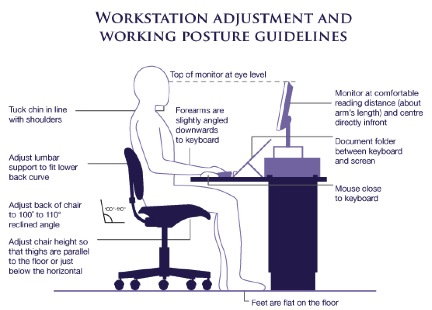 • Screen position
• Screen position
• Chair height/desk height
• Keyboard and mouse position
• Breathe from your diaphragm
• Don’t squint
• Don’t cross legs
• Use a headset (if necessary)
• Standing desks are great also
The following ideas can aid in your quest for posture perfection!
 Lumbar Roll
Lumbar Roll
By far the most important postural aid is the lumbar roll. Setting the lumbar spine into a more lordotic curve by wedging the lumbar roll in the small of your back will ensure the typical ‘hunchback’ posture is avoided.
Get Moving
If possible, the longest time spent at your desk should not exceed 60 minutes. It is important to set aside some time to step out of the office and give your body a break from sitting at a desk and staring at a computer screen. Go for a brisk walk or run and enjoy the outdoors. Some of the benefits of exercise include:
- Improves circulation of oxygen to muscles
- Increases energy levels
- Reduces stress
- Strengthens muscles
- Maintains mobility
The Top 6 Exercises to reduce or prevent pain in the workplace
Performing these basic exercises everyday will ensure you remain mobile and flexible and prevent the majority of postural related musculoskeletal injuries.
1. Thoracic Extension over a rolled towel (5 minutes, twice per day)
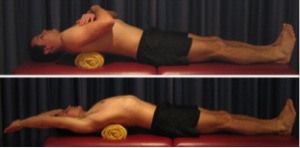
2. Lumbar Extension lying or standing (3 sets of 10, twice per day)
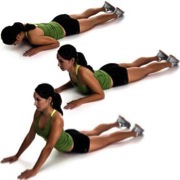

3. Chest Stretches (5 sets of 20 second stretches, 3 times per day)
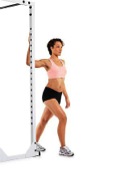
4. Cervical retraction/chin tucks – deep neck muscle strengthening for stability (10 second holds, 10 repetitions, 3 times per day)


5. Upper trapezius and levator scapula stretches (5 sets of 20 second stretches, 3 times per day)

6. Gluteals (5 ses of 20 second stretches, 3 times per day)
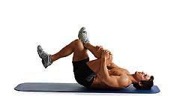
Revesby Physiotherapy has been established for more than 25 years and provides the local area with a high level of expertise in the assessment and treatment of musculoskeletal injuries. Health Mates members receive a discount on treatment – phone them today on 9772 2586 and organise your FREE initial assessment.









